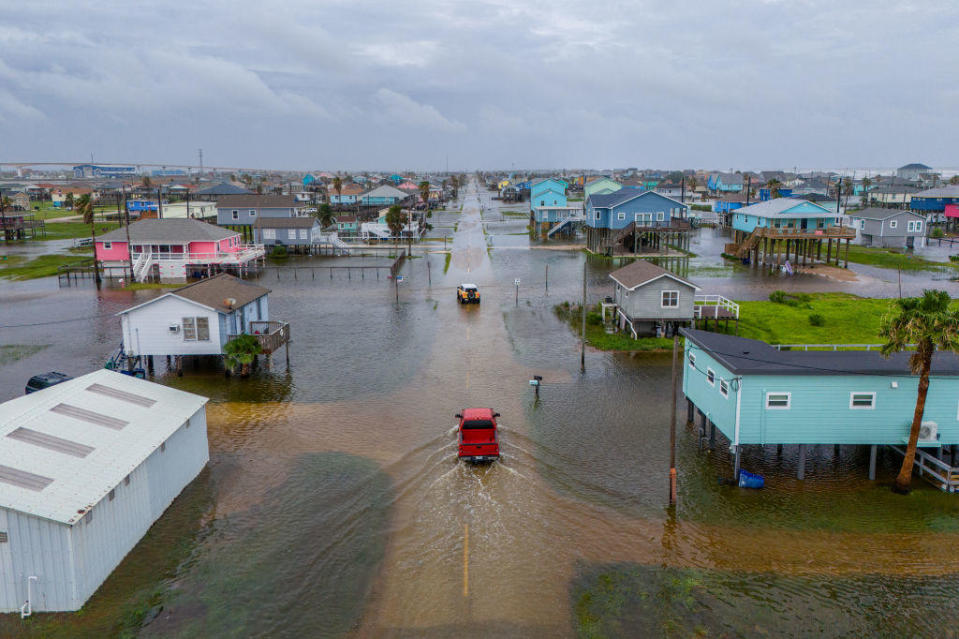Atlantic season's first tropical storm, Alberto, takes aim at Mexico, Texas
The first tropical storm of the Atlantic season formed over the Gulf of Mexico Wednesday, the National Hurricane Center said. The storm, named Alberto, is forecast to bring heavy rains to northeastern Mexico and southern Texas.
The center of Alberto is likely to reach the Mexican coast early Thursday, and was forecast to strengthen before making landfall. On Wednesday evening, the National Hurricane Center said the storm system was moving towards the region at about 9 miles per hour and was 320 miles southeast of Brownsville, Texas, and 135 miles southeast of Tampico, Mexico.
Alberton is a "large tropical storm," the hurricane center said, with maximum sustained winds of 50 mph and tropical storm-force winds extending outward up to 460 miles.
While the storm was hours away from making landfall, its effects were already being felt. In the Texas city of Surfside, located south of Houston, rain totals had already topped nearly 4 inches early Wednesday evening, and some residents were forced to evacuate.

Search and rescue teams on a water raft found two women stranded in a car, the water nearly up to the tires.
In Galveston, Texas, several Juneteenth events were rescheduled due to flooded streets. And in Jamaica Beach, flood levels left most streets closed to traffic.
In Corpus Christi, Texas, a CBS News crew could see the water already spilling out onto the streets near the marina.
According to Reuters, local emergency services in the Mexican state of Nuevo Leon reported that a 15-year-old boy was swept away and drowned in a river outside the city of Monterrey.
A Tropical Storm Warning was in place for the Texas coast from the San Luis Pass south to the mouth of the Rio Grande and the northeastern coast of Mexico from the Rio Grande mouth to Tecolutla.
Rainfall amounts of 5 to 10 inches are possible across northeast Mexico into southern Texas, with maximum totals of 20 inches in the Mexican states of Coahuila, Nuevo Leon, and Tamaulipas, probably resulting in "considerable flash and urban flooding along with new and renewed river flooding. Mudslides are also possible in areas of higher terrain across northeast Mexico," meteorologists said. A storm surge as high as four feet might hit parts of the Texas coast.
The storm is expected to weaken once it moves inland and "dissipate over Mexico" by Thursday night, according to meteorologists.
The hurricane center initially upgraded what had been the season's first tropical storm watch to a tropical storm warning at 4 a.m. CT on Tuesday. Three hours later, the government of Mexico issued a tropical storm warning for the parts of the country's northeastern coast, south of the mouth of the Rio Grande to Puerto de Altamira, replacing the tropical storm watch previously in effect there. The difference accounts for timing — forecasters will generally issue a "watch" when tropical storm conditions are possible in the impacted area within roughly 48 hours, and a "warning" when the conditions become more imminent, about 36 hours out.
The Atlantic hurricane season officially began June 1 and runs through the end of November, with most storm activity typically happening during the later months of that window, between mid-August and mid-October. The terms hurricane and tropical cyclone can refer to the same kind of storm, with meteorologists using tropical cyclone as a broad classification that includes any weather phenomenon where rotating, low-level cloud systems and thunderstorms develop over tropical or subtropical waters, according to the National Oceanic and Atmospheric Administration.
A tropical cyclone is categorized more specifically as a tropical storm once its maximum wind speeds exceed 39 mph. When sustained winds reach 74 mph or higher, it becomes a hurricane.
Melinda French Gates reflects on personal growth, commitment to advocacy
Justin Timberlake arrested on DWI-related charges in New York

